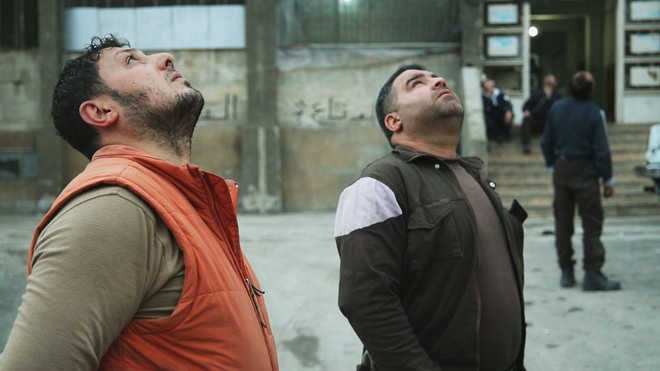A besieged city in strife
Navnee Likhi
“It’s not about us. The worry is our children. There is no place to send them to.” — Khaled Omar Harrah
After seven years of conflict and loss of 4,70,000 lives, what is there to say about the Syrian civil war? Syrian journalist filmmaker Firas Fayyad and Danish co-director Steen Johannessen’s documentary Last Men in Aleppo is a gripping story of extraordinary bravery of three men Khaled Omar Harrah, Subhi and Mahmoud, as members of a Syrian civil defence rescue organisation, known as White Helmets, who help in rescuing the living and the dead from the rubble of collapsed buildings. They are real, caring people who did ordinary jobs before the war started. “This is our destiny and we will die like everyone else,” says Khaled.
The film captures the shock and awe of mass-scale destruction. Simple and pragmatic in its focus, the film tracks a number of individual White Helmets, who had the courage of conviction. After a rescue mission, one of them asks his co-worker, “Should we sit down and cry or what?” The film often posed the questions — Why did it happen? How can people in power have such disregard for human life? When will it end?
The director of photography Fadil Al Halabi shot the documentary with poise and precision keeping an eye on human activity at the very edge of every scene. The tone throughout the film is of no-nonsense candor and not elevated martyrdom. Filmmaker Fayyad was arrested twice by the Syrian government and tortured before he was able to shoot his documentary. After his release, he filmed it in east Aleppo for two years, along with his team and faced life-threatening risks, when they recorded the daring rescue operations by White Helmets.
This documentary incorporates moments of heart-pounding suspense. It also draws us into the lives of the protagonists, Khaled, a boisterous married man with children, and Mahmoud and Subhi, quiet young men who are propelled by a sense of duty but are uncomfortable with any display of heroism. The three grapple with chaos around them and struggle with an ever-present dilemma — do they flee or stay. They decide to stay back and save lives of their fellow men. Before the war breaks, Khaled is working as a painter and decorator while Mahmoud and Subhi are students.
Amid the misery of war, the film lends grace by showing snapshots of Mahmoud catching up with his friends, Khaled playing with his children in a war-ruined compound. They often talk about the situation they are caught in and with a mixture of sardonic humour and gloomy resignation of their fate, trying to figure out why they stayed back. Khaled assesses that it is better to live under siege than face death with hundreds of others being shipped in boats to refugee camps. He feels he would rather see his children die, along with him, than see them suffer far away. But this doesn’t not stop him and his men from helping families that want to take refuge in Turkey.
The documentary opens with a shot of golden fish eye, which is one of the surreal moments that the possibility of ordinary life exists. But it quickly moves to the next scene where east Aleppo is shown under siege by missile attack. Khaled and his volunteers speed through the city in their vans and ambulances, stopping and struggling to save lives from bombed out blocks of buildings and smoking ruins. As the men comb the ruins, Khaled rescues a baby who survives the attack and is nicknamed ‘hero of Aleppo’. Succeeding scenes in the film unfold horror of the attacks. All these heart-wrenching scenes leave Khaled and his team of rescue workers numb. As Mahmoud visits some kids he had rescued earlier, a tender meeting punctuated by one of the boy’s constant questioning and nervous refusal to let him go, leaves him teary-eyed. There are other touching moments in the film for instance when a young girl rescued from death under the rubble of her house refuses to let go of Khaled and his men. This gesture moves them. But the girl knows that Aleppo is no longer a place for happiness or gratitude.
Fayyad as director does not flinch from showing gruesome details like body parts under the rubble — with little break from tears and desperation as children and other injured, gasp with their wounds without any proper treatment. Amid unending gloom, Khaled sets up a goldfish pond at White Helmet headquarters, which serves as a metaphor for survival. Last Men in Aleppo shows the power of cinema. The film depicts stark reality of life in east Aleppo. The documentary is unnerving to watch but then it also gives hope that there is light at the end of tunnel.










